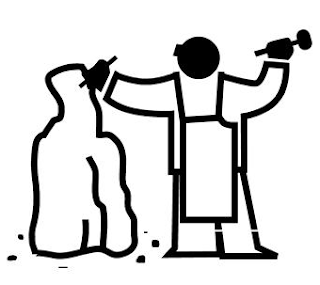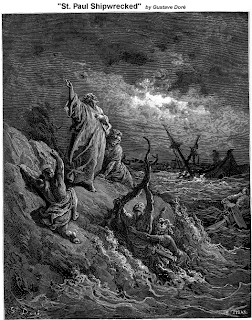TO CHEW ON: "And whenever you stand praying, if you have anything against anyone, forgive him, that your Father in heaven may also forgive you your trespasses." Mark 11:25
Some time ago I heard a local talk show host speak with great indignation against the idea that the way to handle Jerry Sandusky, the former football coach and child predator, was to forgive him. I only heard a snippet of his argument so I don't know whether the call was for law enforcement to let him go free for his crimes, or for the individuals wronged by him to forgive. But the man's rant got me thinking.
What is the way, the Jesus way, to handle people who have wronged us in a deep, life-altering manner—the investment counselor who has absconded with our life savings, the father or mother who never loved us, the coach, teacher, or family member who stole innocence?
Jesus' words are unequivocal: "...if you have anything against anyone, forgive him, that your Father in heaven may also forgive you your trespasses."
Of course on a societal level, the government should enforce its laws against criminals and see that the penalty is paid. An orderly society demands that people live by standards and that law-breakers be dealt with. The Bible supports that - Ezra 7:26; Matthew 22:21; Romans 13:1; 1 Peter 2:13,14.
However, personally, according to Jesus, we need to forgive. It sounds unfair and unrealistic, another example of the upside-downess of the Kingdom of God lifestyle. Leslyn Musch says about this passage (along with Matthew 6:14,15):
"Understand that God forgives us our sins as we forgive others who have sinned against us. Adopt the forgiveness of others into your prayer life as a daily discipline" - Leslyn Musch, Truth-In-Action Through the Synoptics, New Spirit-Filled Life Bible, p. 1439.
PRAYER: Dear God, something inside me balks at giving forgiveness—until I look at what You've forgiven me. Help me to measure every act of forgiveness on my part against Your forgiveness of me. Amen.
MORE: Forgiveness in action
Josh MacDowell tells the story of his struggle to forgive several people who had wronged him in his book Undaunted. Here is his account of how he forgave the man who abused him as a child (ellipses enclosed in square brackets indicate words left out of the quote, other ellipses are in the quote):
"It didn't happen immediately; in fact, it took several months and a lot of counseling with Pastor Logan. [....]
"He lived in a drab apartment in Jackson, Michigan. I knocked on the door, he opened it, and I walked inside. [....] I looked at the greying, worn-looking man with troubled eyes and started in without preliminaries: 'Wayne, what you did to me was evil. Very evil! But I've come to know Jesus Christ as Savior and Lord. And I've come here ... to ... tell you ...' My carefully rehearsed words failed me. I prayed for strength and realized that what I had to say had to come from my heart, not my head.
"I sighed deeply. 'Wayne, all of us have sinned, and no one measures up to God's standard of perfection. We all need redemption and, well, I've come here to tell you something you need to hear.' He looked at me his pale eyes unblinking.
"For a moment, I wished it weren't true, but it was, and I had to say it out loud. 'Christ died for you as much as He did for me. I forgive you, Wayne.'
"[....] I walked out to the parking lot and got into my car. Where is the emotion? I asked myself, starting up the engine. Where is the euphoria I should feel having stared down the demon—and the demons—of my past? [....] And then it hit me. There was peace in my heart. A peace unlike anything I had experienced before. I had chosen to forgive an enemy out of obedience to God's command, and I had the steady, full peace the Bible describes as surpassing human understanding" - Josh MacDowell, Undaunted pp. 140-142 (Kindle edition).
*******
Unless otherwise noted all Scripture quotations are taken from the New King James Version®. Copyright © 1982 by Thomas Nelson, Inc. Used by permission. All rights reserved.










.png)







